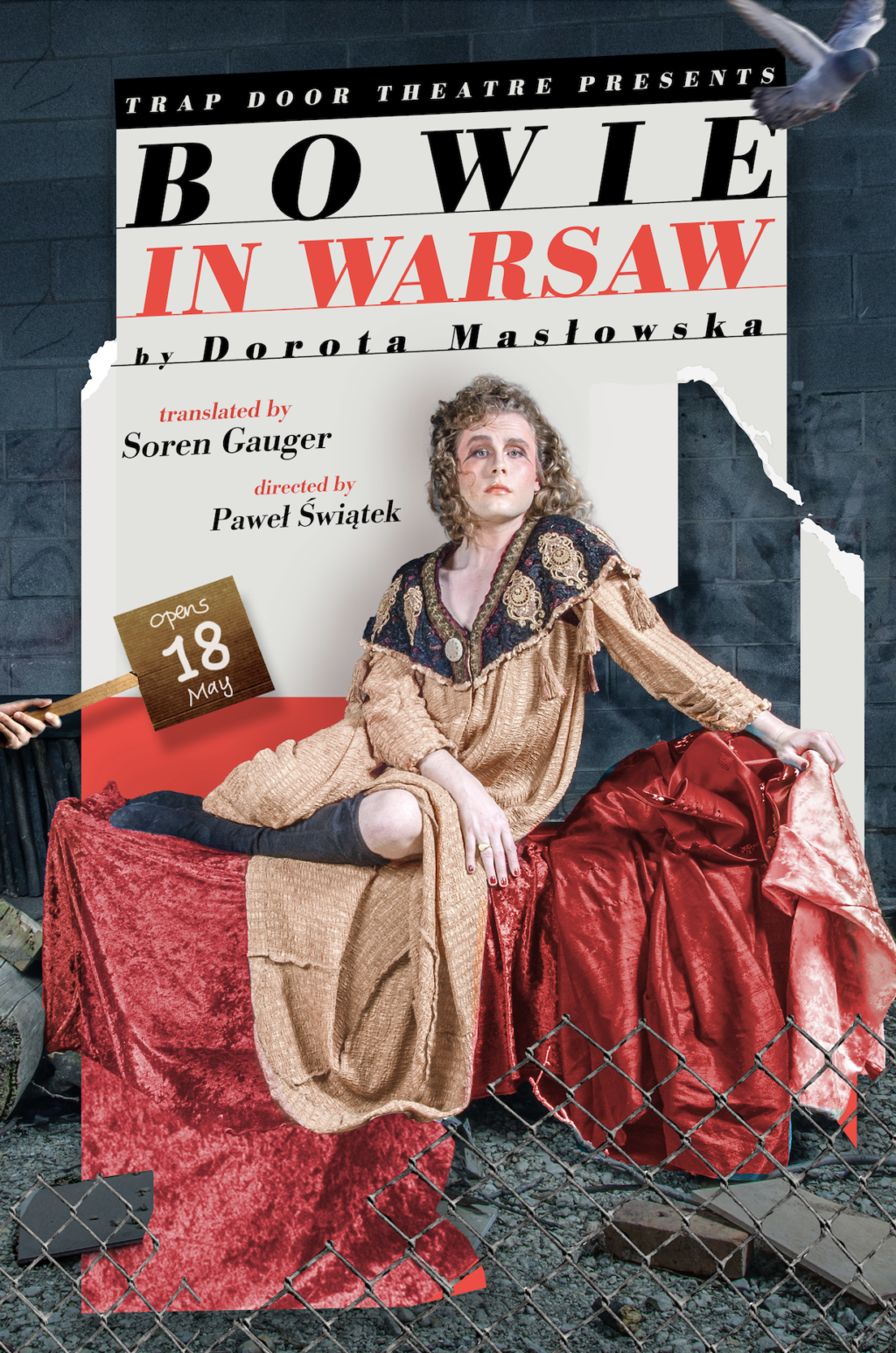
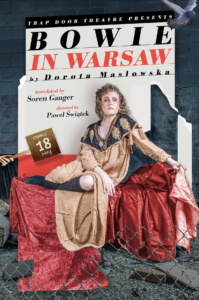 [rating=2]Can you imagine a world where people rarely smile or laugh? Or where they are weighed down by society’s burdens that they have no control over? In 1977, David Bowie recorded a song called “Warszawa”, based on his travels to Warsaw, Poland, the previous year. According to Wikipedia, “The piece is intended to evoke the ‘very bleak atmosphere’ Bowie said he experienced from his visit….” Bowie’s mostly instrumental song thus became the inspiration for the play “Bowie in Warsaw” by Dorota Masłowska. The story is also nominally based on the true story of a serial killer, who (together with several accomplices) allegedly killed fourteen women from 1964 to 1970. Originally written in Polish, the script was subsequently translated into English by Soren Gauger and serves as the basis for today’s performance.
[rating=2]Can you imagine a world where people rarely smile or laugh? Or where they are weighed down by society’s burdens that they have no control over? In 1977, David Bowie recorded a song called “Warszawa”, based on his travels to Warsaw, Poland, the previous year. According to Wikipedia, “The piece is intended to evoke the ‘very bleak atmosphere’ Bowie said he experienced from his visit….” Bowie’s mostly instrumental song thus became the inspiration for the play “Bowie in Warsaw” by Dorota Masłowska. The story is also nominally based on the true story of a serial killer, who (together with several accomplices) allegedly killed fourteen women from 1964 to 1970. Originally written in Polish, the script was subsequently translated into English by Soren Gauger and serves as the basis for today’s performance.
While the show ostensibly has to do with an actual strangler who has been terrorizing the population, it really has to do with how the Polish people have been strangled in a very different way. In Soviet-era Poland, they have been stifled in what they can do with their lives and their futures. People are afraid to get close to others. They are stifled in what they can say to strangers. Life is humdrum and tedious and physically and psychologically violent. Spouses might get drunk and beat up their wives, or those in domestic or familial relationships might become the object of abuse in some other way. Careers (when they exist) go nowhere. Throughout there is hopelessness and helplessness. The general milieu is personified by the various characters in this show. We largely follow the lives of Regina (Emily Nichelson) and her mother (Holly Cerney). David Bowie (David Lovejoy) even makes an appearance! Other cast members include Emily Lotspeich, Miguel Long, Laura Nelson, Tia Pinson, Keith Surney, and Bob Wilson.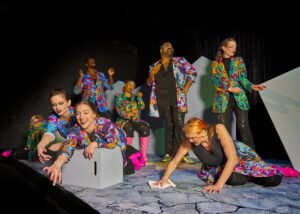
Viewing the washerwoman cleaning the floor (from before the performance begins all the way through to the very end) seems pointless at first, yet for her, this is a relief from being under the thumb of her drunken husband. More to the point, this is meant to be a metaphor for the fact that under Soviet dominance, there is a certain drudgery that makes each day somewhat similar to the next. What might serve as a bit of a bright spot in their lives has to do with the unusual sighting of an American tourist visiting Warsaw. The tourist might even want to pick up a book about Poland or the Polish language. But it is the book by Krampinski that most people might want to purchase, entitled “Spring Isn’t Coming.” Needless to say, that is the underlying theme of the show.
The acting is great, and the directing by Pawel Świątek is fantastic. The costumes by Rachel Sypniewski are good; I especially liked the glittering black pants that everybody wears and their bright vinyl pink boots. The flashy multicolored blazers add interest. The large, gray geometric props that serve as furniture and hiding places, et al., reminded me of gravestones, which may be quite intentional but didn’t excite me. I did like the pattern on the floor though, thanks to Merje Veski. With that in mind, the lighting design by Richard Norwood works well in bouncing off the gray surfaces, and the various lighting effects neatly capture the characters’ diverse emotions. That feeds into the makeup, hair, and wig design by Syd Genco, all of which is very creative. The makeup is generally more reminiscent of American indigenous tribes than it is of 20th century Poland. What these colors and shapes seem to do is to bring out aspects of the characters’ painful emotions which they wrestle with on a daily basis.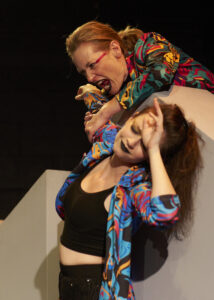
All throughout, the characters dialogue using a good number of Polish references, so we have a basic sense of the nation we are in, even if we don’t exactly where the action is specifically taking place—or exactly what it consists of. Hence, we never learn what has happened to the perpetrator of these violent crimes that we are being told about. We hear about them every so often, and it is hinted at that they are in the midst of the entire populace, but this person is never found out, at least not during the duration of the performance. So together with that evil lurking in the shadows, there’s no escape from a grayness that seems to have no meaning.
I realize that Masłowska is considered to be “one of the most renowned Polish writers and playwrights.” But was something being lost in translation? The show has lots of fascinating elements taken separately that, to my mind, don’t gel as they should. Is this story supposed to be so existential that it becomes the theatre of the absurd? Is it meant to portray the characters’ brush with (philosophical) atomism? Some of the monologues are poetic; others just seem superfluous, strange, and illogical. I recognize the words, but they often don’t make any sense. And when they start to make sense, then something shifts within the scene (or the scene shifts), and the words are not making sense again within a whole new context. The production is billed as an “absurd comedy”, but I didn’t find it so funny, with everything being so sad. It seemed like a younger crowd laughed at the jokes more hardily than I did.
During the years of Soviet domination of Eastern Europe, Poland was a dreary place, and the people who lived there frequently became numb to life. But this ninety-minute production also numbs the audience, making it agonizing to watch. In keeping with Bowie’s bleak song, the situation seems so dank and pessimistic that it no longer seems to have a foot in the real world. Was life’s pointlessness the point of the performance? Was I supposed to get bored?
“Bowie in Warsaw” is playing through July 1, 2023, at the Trap Door Theatre, 1655 W. Cortland Street, in Chicago.
Tickets are $25 with 2-for-1 admission on Thursdays.
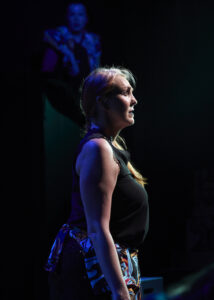 Note there will be a talkback with playwright Dorota Masłowska and a small reception after the Saturday, May 20th performance. This performance ticket price will be $35.
Note there will be a talkback with playwright Dorota Masłowska and a small reception after the Saturday, May 20th performance. This performance ticket price will be $35.
Performance schedule:
Thursdays, Fridays, and Saturdays at 8:00 p.m.
Tickets are available at https://trapdoor.ticketleap.com/bowie-in-warsaw/ or by calling 773-384-0494.
Group rates are available. For information, email boxofficetrapdoor@gmail.com or call 773-384-0494.
For more information about this and other shows and for general information, please visit: https://trapdoortheatre.com/.
COVID restrictions: None at this time.
To see what others are saying, visit www.theatreinchicago.com, go to Review Round-Up and click at “Bowie in Warsaw”.






More Stories
” Diary of a Black Illusionist: Walter King Jr.”/ Chicago Magic Lounge reviewed by Paul Lisnek
“Survivors” reviewed by Julia W. Rath
“Prayer for the French Republic” reviewed by Julia W. Rath ( and another by Paul Lisnek)